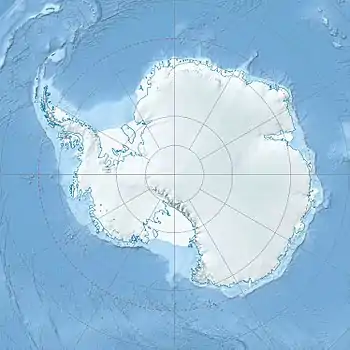| Trilling Peaks | |
|---|---|
 | |
| Highest point | |
| Coordinates | 67°58′S 62°45′E / 67.967°S 62.750°E |
Trilling Peaks (67°58′S 62°45′E / 67.967°S 62.750°E) is a group of linear nunataks, comprising three main peaks standing three miles south of South Masson Range in the Framnes Mountains, Mac. Robertson Land.[1]
Exploration
Trilling Peaks was mapped by Norwegian cartographers from air photos taken by the Lars Christensen Expedition, 1936-37, and named Trillingnutane (the triplet peaks). Not: Trillingnutane.[1][lower-alpha 1]
Features

Features include:[3]
Price Nunatak
67°57′S 62°43′E / 67.950°S 62.717°E. Nunatak marking the north end of the Trilling Peaks, 3 miles (4.8 km) south of Mount Burnett in the Framnes Mountains, Mac. Robertson Land. Mapped by Norwegian cartographers from air photos taken by the Lars Christensen Expedition, 1936-37. Named by ANCA for H. Price, senior diesel mechanic at Mawson Station in 1959.[4] Price Nunatak has an elevation of about 1,170 metres (3,840 ft). It has two peaks, with a deep wind scour between them. The northern peak has a variable lichen flora.[5]
Watson Nunatak
67°58′S 62°45′E / 67.967°S 62.750°E. Nunatak standing between Price and Van Hulssen Nunataks in the Trilling Peaks, Framnes Mountains, in Mac. Robertson Land. Mapped by Norwegian cartographers from air photos taken by the Lars Christensen Expedition, 1936-37. Named by ANCA for K.D. Watson, diesel mechanic at Mawson Station, who assisted in the Framnes Mountains Depot Peak survey by AN ARE in 1965.[6]
Van Hulssen Nunatak
67°59′S 62°45′E / 67.983°S 62.750°E. Nunatak at the south end of the Trilling Peaks in the Framnes Mountains, Mac. Robertson Land. Mapped by Norwegian cartographers from air photos taken by the Lars Christensen Expedition, 1936-37. Named by ANCA for F. Van Hulssen, technical officer (ionosphere) at Mawson Station in 1959.[7] Van Hulssen Nunatak has an elevation of about 1,330 metres (4,360 ft). Lichens have been collected on the southern faces of the nunatak and on the western scree slopes.[8]
Notes
- ↑ Filson (1966) includes the Price Nunatak and other nunataks to the south in the South Masson Range.[2] We follow Alberts (1995) in treating these nunataks as part of the separate Trilling Peaks.[1]
References
- 1 2 3 Alberts 1995, p. 759.
- ↑ Filson 1966, p. 26.
- ↑ Framnes AADCMap.
- ↑ Alberts 1995, p. 589.
- ↑ Filson 1966, p. 25.
- ↑ Alberts 1995, p. 798.
- ↑ Alberts 1995, p. 776.
- ↑ Filson 1966, p. 27.
Sources
- Alberts, Fred G., ed. (1995), Geographic Names of the Antarctic (PDF) (2 ed.), United States Board on Geographic Names, retrieved 2023-11-07
 This article incorporates public domain material from websites or documents of the United States Board on Geographic Names.
This article incorporates public domain material from websites or documents of the United States Board on Geographic Names. - Filson, Rex B. (1966), The Lichens and Mosses of Mac. Robertson Land (PDF), Antarctic Division, Department of External Affairs Australia, retrieved 2023-11-28
- Framnes Mountains Satellite Image Map, Australian Antarctic Data Centre, retrieved 2023-11-18